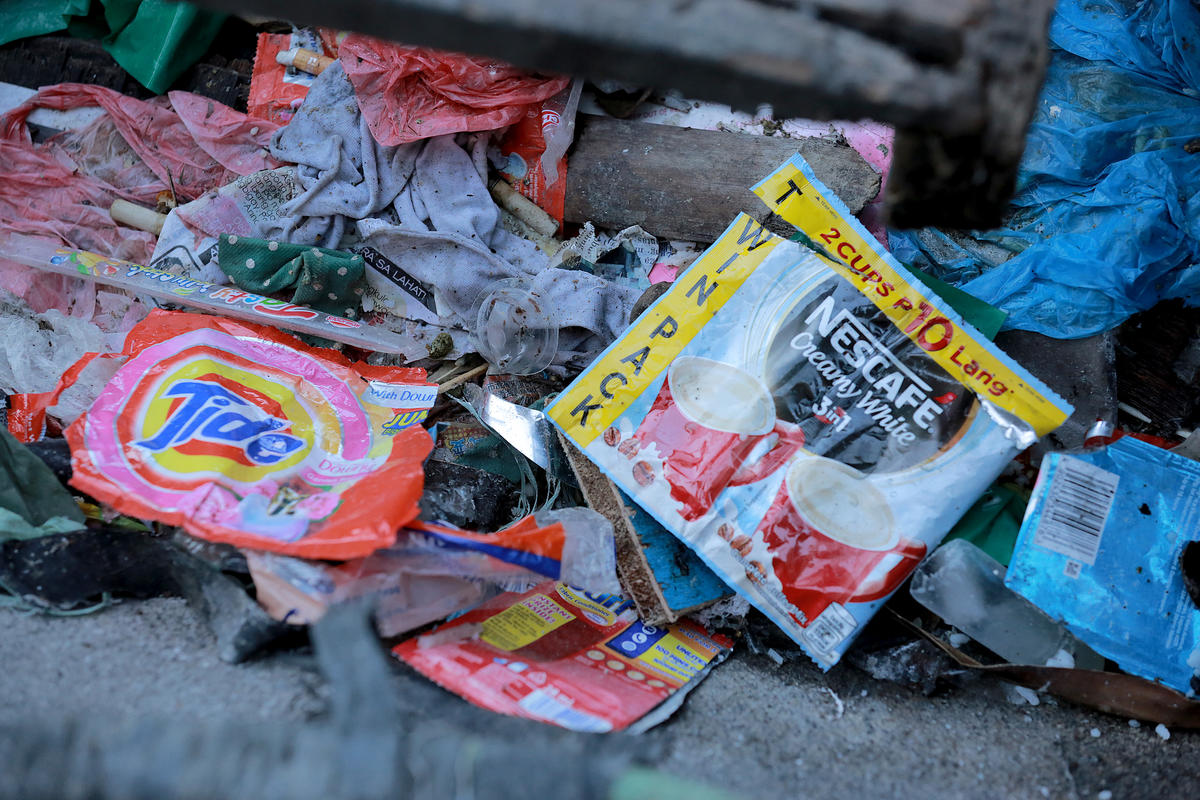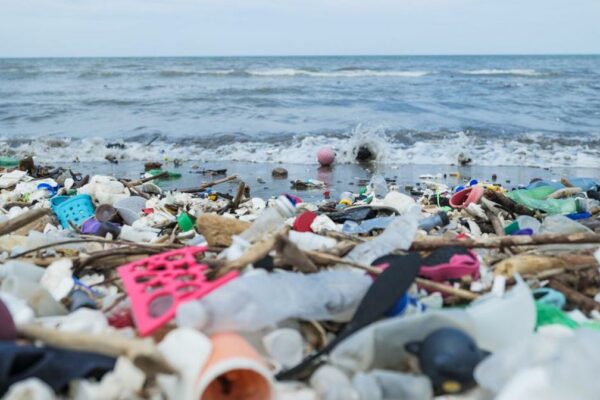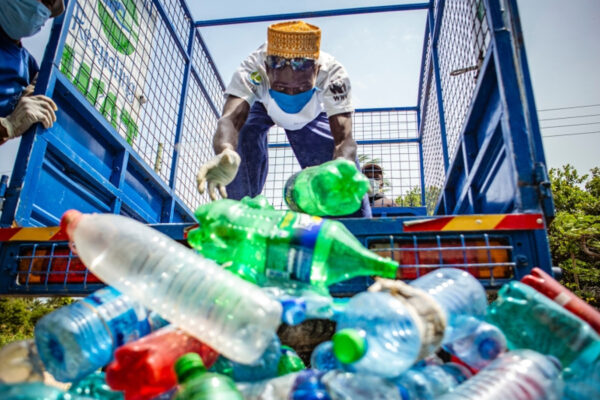Determined to Cut Back on Plastic Waste, Big Brands Pledge to Eliminate Single-Use Plastic
Escalating plastic pollution makes eliminating single-use plastic waste more crucial than ever. The big companies across the world manufacturing household goods, beauty products or other consumer goods use an extensive amount of plastic. The durability and versatility of plastic have made it so useful that it now dominates every aspect of our lives. As a result, the use of plastic products and the amount of plastic waste in landfills and oceans have increased ten folds in the past few decades.
The harmful effects of plastic pollution are quite evident in the environment. The ecosystems are collapsing, oceans are choking on plastic and landfills are littered with it. The scientists have warned the world numerous times against the usage of plastic products and its hazardous effects.

Plastic pollution from FMCG goods has contaminated the land and oceans / Image: Greenpeace
As the threat escalates, many big FMCG brands of the world are eliminating single-use plastic waste . These companies have pledged to amend their production and packaging processes to help reduce plastic pollution and save the environment. More and more companies are ditching plastic in order to help save the planet from an impending doom owing to plastic pollution.
Table of Contents
Nestle
Last year, Nestle, which is the world’s largest packaged food company, announced its commitment to making all of its packaging recyclable or re-usable by 2025. At the beginning of 2019, the company announced a series of actions toward that commitment and eliminated plastic straws in all its products.
The vision of the company is that none of its packaging, including plastics, ends up in landfills or as litter. Nestle planned to replace the plastic packaging for its chocolate bars with the paper packaging. The company is also planning to transition the packaging of its drinks from plastic to paper containers.
Starbucks
Starbucks, the largest food and beverage retailer, has pledged to eliminate plastic straws from its stores by 2020. The company aims to eliminate plastic straws from 28,000 company-operated and licensed stores across the globe by making a straw-less lid or alternative-material straws.
The company has always been environmentally concerned and has partnered with the World Wildlife Fund. They estimate that their plans will reduce more than one million plastic straws each year. They have partnered with Starbucks in waste reduction initiatives such as Next Gen Consortium Cup Challenge and WWF’s Cascading Materials Vision.
Unilever
The 90-year-old global brand has committed itself to eliminate the plastic packaging in Unilever products that span over 400 brands. It aims to make all of its plastic packaging either reusable, recyclable, or compostable by 2025.
By doing so, the company will ensure that plastic packaging stays within a “circular economy” where it can be produced and reused, rather than becoming waste and ending up in the oceans. Although it would be a major challenge to develop the technology to make plastics that can be effectively recycled and transform its global supply chain as well.
Dove
The leading beauty care products brand has announced an initiative to cut back on its plastic waste. The brand aims to “reduce the use of virgin plastic by more than 20,500 tons per year.” The brand’s parent company, Unilever, has made a commitment to establish a circular plastic economy as it directly addresses the fact that single-use packaging is a major contributor to plastic waste.
Dove is working on developing environmentally-friendly packaging for its products and switching to plastic-free packs for soap bars by the end of 2020. It is driving a movement to create new value for plastics and reducing the volume of plastic packaging it produces.
Eliminating single-use plastic waste , Dove now uses bottles made from 100 percent recycled plastic. Highlighting this progress through a new promotional campaign, the brand has also installed an uncommon vending machine in New York’s Grand Central Terminal in early 2020.
The installation invites people passing by to deposit their used plastic in exchange for a bottle of Dove Body Wash in its new recycled plastic packaging.
Coca-Cola
In 2018, Coca-Cola announced an industry-first goal to collect and recycle the equivalent of every bottle or can it sells globally by the year 2030. The company will achieve the goal, which is part of the original plan called “World Without Waste,” by focusing on the entire packaging life-cycle.
The company is focusing on developing 100 percent recyclable packaging and reducing the amount of plastic in its bottles. It will be monitoring the whole packaging process – from how bottles and cans are designed and made, to how they are recycled and re-purposed.
McDonald’s
Last year, McDonald’s planned to stock its 36,000 restaurants in 122 locations across the world with packaging – including straws – that are obtained from renewable, recycled, or certified sustainable sources. The fast-food giant aims to complete this goal of recycled packaging by the year 2025, according to BBC.
Presently, only half of McDonald’s customer packaging comes from renewable, recycled, or certified sources and nearly two-thirds of fiber-based packaging comes from recycled or certified sources. An estimated 10 percent of McDonald’s restaurants are globally recycling customer packaging. The brand is also part of Starbucks and WFF’s Next Gen Consortium Cup Challenge.
The Walt Disney Company
The Walt Disney Company has committed to eliminating single-use plastic straws and plastic stirrers at all owned and operated locations across the globe, which is an estimated reduction of more than 175 million straws and 13 million stirrers each year.
Along with the reduction of single-use plastic products, the company aims to transition to refillable in-room amenities in their hotels and cruise ships to reduce an estimated 80 percent of plastics in guest rooms. To reduce the use of plastics, the company will offer reusable bags at a nominal price and eliminate polystyrene cups across their global owned and operated business.
IKEA
Eliminating single-use plastic waste since 2008, IKEA stopped offering plastic shopping bags to its customers across the globe, reducing the use by 50 percent. Last year, the company made a commitment to eliminate single-use plastic products from its home furnishing range globally by 2020. This includes straws, plates, cups, freezer bags, garbage bags, and plastic-coated plates and cups.
IKEA Group will also phase out single-use plastic items offered in customer and co-worker restaurants, bistros, and cafes, including straws, cups, cutlery, plates, and beverage stirrers.
Evian
France-based mineral water brand, Evian, planned to address the challenge of plastic pollution through a new approach. By 2025, the company aims to become “circular.” It pledged to recycle plastic in order to help save the planet.
Evian vowed to work to increase dismal consumer recycling rates, and partner with a non-profit that works on collecting plastic from oceans. It will make all plastic bottles from 100 percent recycled plastic by 2025, compared to the current 25 percent.
Loop
Loop is a global “circular shopping” platform, which is designed to eliminate the idea of waste by transforming the products and packaging of everyday items from single-use to durable, multi-use, feature-packed designs.
In partnership with major brands and retailers, Loop is changing the packaging tradition and playing a significant role in eliminating the plastic packaging that eventually ends up in either landfills or oceans.
Adidas
Adidas makes around 400 million pairs of shoes annually and producing such colossal amount of shoes requires many resources that can be harmful to the environment. Therefore, the brand finally decided to fight against plastic pollution. It has collaborated with an environmental organization called Parley for the Oceans and started using plastic collected from the oceans to make shoes and sportswear.
For the past few seasons, Adidas has been eliminating single-use plastic waste by making football jersey for Real Madrid from the ocean plastic. In 2019, Adidas expects to manufacture 11 million pairs of shoes from the recycled plastic removed from the seas.
PUMA
Since 2015, the sportswear brand has been committed to the cause of sustainability. PUMA with a motive to accomplish its goal of a real and sustainable change through collective development in sportswear supply chains became part of a collaborative effort facilitated by the Sustainable Apparel CoalitionF (SAC) in October 2015.
Recently, the brand has collaborated with First Mile to create sustainable sportswear collection from recycled plastic bottles and prevented 40 tons of plastic waste to end up in landfills and ocean.
Holland & Barrett
Committing to the elimination of single-use plastics, the UK’s leading health retailers, Holland & Barrett had pledged to ban the sale of wet wipes in its 800 stores. Single-use wet wipes are responsible for 80 percent of blockages in UK sewers, according to a study by Water UK, due to their durability, which also contributes to ocean pollution.
Meanwhile, EarthWatch Institute and Plastic Oceans UK found 9.3 million wipes are flushed down toilets in the UK every single day, which can end up on beaches. The Marine Conservation found an average of 12 wipes per 100m on UK beaches.
Although these initiatives will not help the environment much, the small steps do contribute toward a better tomorrow. The other global manufacturing companies must commit to the cause and eliminate the use of plastic so that the ecosystems can be preserved from its noxious effects.


